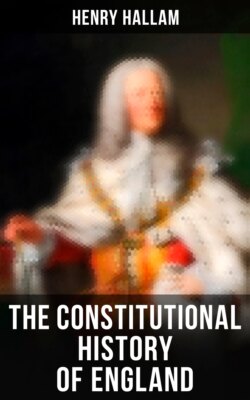Читать книгу The Constitutional History of England - Hallam Henry - Страница 8
На сайте Литреса книга снята с продажи.
PREFACE
ОглавлениеTable of Contents
The origin and progress of the English Constitution, down to the extinction of the house of Plantagenet, formed a considerable portion of a work published by me some years since, on the history, and especially the laws and institutions, of Europe during the period of the middle ages. It had been my first intention to have prosecuted that undertaking in a general continuation; and when experience taught me to abandon a scheme projected early in life with very inadequate views of its magnitude, I still determined to carry forward the constitutional history of my own country, as both the most important to ourselves, and, in many respects, the most congenial to my own studies and habits of mind.
The title which I have adopted, appears to exclude all matter not referable to the state of government, or what is loosely denominated the constitution. I have, therefore, generally abstained from mentioning, except cursorily, either military or political transactions, which do not seem to bear on this primary subject. It must, however, be evident, that the constitutional and general history of England, at some periods, nearly coincide; and I presume that a few occasional deviations of this nature will not be deemed unpardonable, especially where they tend, at least indirectly, to illustrate the main topic of enquiry. Nor will the reader, perhaps, be of opinion that I have forgotten my theme in those parts of the following work which relate to the establishment of the English church, and to the proceedings of the state with respect to those who have dissented from it; facts certainly belonging to the history of our constitution, in the large sense of the word, and most important in their application to modern times, for which all knowledge of the past is principally valuable. Still less apology can be required for a slight verbal inconsistency with the title of these volumes in the addition of two supplemental chapters on Scotland and Ireland. This indeed I mention less to obviate a criticism, which possibly might not be suggested, than to express my regret that, on account of their brevity, if for no other reasons, they are both so disproportionate to the interest and importance of their subjects.
During the years that, amidst avocations of different kinds, have been occupied in the composition of this work, several others have been given to the world, and have attracted considerable attention, relating particularly to the periods of the Reformation and of the civil wars. It seems necessary to mention that I have read none of these, till after I had written such of the following pages as treat of the same subjects. The three first chapters indeed were finished in 1820, before the appearance of those publications which have led to so much controversy, as to the ecclesiastical history of the sixteenth century; and I was equally unacquainted with Mr. Brodie's History of the British Empire from the Accession of Charles I. to the Restoration, while engaged myself on that period. I have, however, on a revision of the present work, availed myself of the valuable labours of recent authors, especially Dr. Lingard and Mr. Brodie; and in several of my notes I have sometimes supported myself by their authority, sometimes taken the liberty to express my dissent; but I have seldom thought it necessary to make more than a few verbal modifications in my text.
It would, perhaps, not become me to offer any observations on these contemporaries; but I cannot refrain from bearing testimony to the work of a distinguished foreigner, M. Guizot, Histoire de la Revolution d'Angleterre, depuis l'Avenement de Charles I. jusqu'à la Chute de Jacques II., the first volume of which was published in 1826. The extensive knowledge of M. Guizot, and his remarkable impartiality, have already been displayed in his collection of memoirs illustrating that part of English history; and I am much disposed to believe that if the rest of his present undertaking shall be completed in as satisfactory a manner as the first volume, he will be entitled to the preference above any one, perhaps, of our native writers, as a guide through the great period of the seventeenth century.
In terminating the Constitutional History of England at the accession of George III., I have been influenced by unwillingness to excite the prejudices of modern politics, especially those connected with personal character, which extend back through at least a large portion of that reign. It is indeed vain to expect that any comprehensive account of the two preceding centuries can be given without risking the disapprobation of those parties, religious or political, which originated during that period; but as I shall hardly incur the imputation of being the blind zealot of any of these, I have little to fear, in this respect, from the dispassionate public, whose favour, both in this country and on the Continent, has been bestowed on my former work, with a liberality less due to any literary merit it may possess, than to a regard for truth, which will, I trust, be found equally characteristic of the present.
June 1827.
